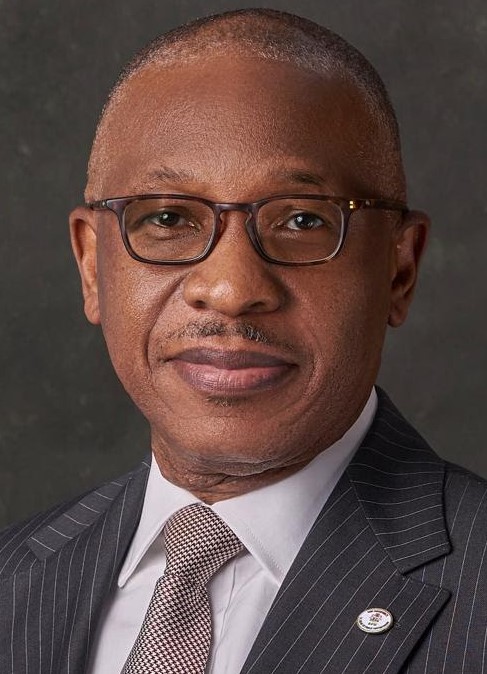President Bola Tinubu on Monday weilded the big stick on Chief Executives of two Federal Government agencies and a member of the Executive Council of the Federation.
Both the Director-General of the Bureau of Public Enterprises (BPE), Alex Okoh, and the Executive Vice-Chairman/Chief Executive Officer, Federal Competition and Consumer Protection Commission (FCCPC), Babatunde Irukera were dismissed from office with immediate effect.
On the other hand, the Minister of Humanitarian Affairs and Poverty Alleviation, Betta Edu, was sent on immediate suspension from office over her alleged misappropriation of funds.
A statement by the Special Adviser to the President on Media & Publicity, Ajuri Ngelale, said the sack of the BPE DG and FCCPC CEO were “in conformity with plans by the government to restructure and reposition critical agencies of the Federal Government towards protecting the rights of Nigerian consumers and providing a strong basis for enhanced contributions to the nation’s economy by key growth-enabling institutions,”
Okoh and Erukera were directed to hand over to the next most senior officers in their respective agencies, pending the appointment of new Chief Executive Officers to their positions.
 For Edu, the Presidential spokesperson said Tinubu ordered her immediate suspension from office as “a demonstration of his administration’s avowed commitment to uphold the highest standards of integrity, transparency, and accountability in the management of the commonwealth of Nigerians.”
For Edu, the Presidential spokesperson said Tinubu ordered her immediate suspension from office as “a demonstration of his administration’s avowed commitment to uphold the highest standards of integrity, transparency, and accountability in the management of the commonwealth of Nigerians.”
Also, the statement said the anti-graft agency, the Economic and Financial Crimes Commission (EFCC) was directed “to conduct a thorough investigation into all aspects of the financial transactions involving the Federal Ministry of Humanitarian Affairs and Poverty Alleviation as well as one or more agencies thereunder.”
“The suspended Minister is hereby directed to hand over to the Permanent Secretary of the Federal Ministry of Humanitarian Affairs and Poverty Alleviation.
She was also directed to fully cooperate with the investigating authorities as they conduct their investigations.
“Furthermore, the President has tasked a panel headed by the Coordinating Minister of the Economy and Minister of Finance, Wale Edun, to, among other functions, conduct a comprehensive diagnostic on the financial architecture and framework of the social investment programmes to conclusively reform the relevant institutions and programmes in a determined bid to eliminate all institutional frailties for the exclusive benefit of disadvantaged households and win back lost public confidence in the initiative.”
Why Erukera, Okoh were sacked
 Although no specific reason was given for Erukera’s removal from office, an authoritative source close to the Presidency said on Monday it might not have been unconnected with series of controversial investigations the FCCPC conducted on some illegal activities involving some powerful persons and organisations which bordered on alleged abuses of consumer protection rights and regulations.
Although no specific reason was given for Erukera’s removal from office, an authoritative source close to the Presidency said on Monday it might not have been unconnected with series of controversial investigations the FCCPC conducted on some illegal activities involving some powerful persons and organisations which bordered on alleged abuses of consumer protection rights and regulations.
For Okoh, reports were that he might have overstayed his welcome in office, as he was entangled in a number controversies involving high profile transactions he superintended under the privatisation programme which many critics alleged were found to have been less than transparent.
Some of the controversial transactions, this newspaper learned, include the sale of the Aluminium Smelter Company of Nigeria (ALSCON); the sale of the Federal Government shares in Galaxy Backbone, and two agencies of the Nigerian Postal Service (NIPOST).
Okoh’s travails
Okoh was appointed into office in April 13, 2017.
In December 2019, Justice Anwuri Chikere of the Federal High Court in Abuja ordered that he should be remanded in prison for a minimum of 30 days, accused of serial disobedience of court orders over the ownership controversy that has stalled the privatisation of ALSCON located at Ikot Abasi in Akwa Ibom State.
Following the bid for the sale of the $3.2bn smelting plant in 2004, a Nigerian-American Consortium, BFIG, emerged the preferred bidder following their declaration by the National Council on Privatization (NCP) as the winner with an offer of $410mn over an offer of $205mn by UC RUSAL.
However, BPE was accused of conspiring with the Russians to frustrate the handing over of the plant to the rightful ownee, resulting in a long drawn legal contest that went all the way to the Supreme Court.
On July 6, 2012, the apex court gave a unanimous ruling that affirmed BFIG as the rightful owner of ALSCON by virtue of the its declaration as winner of the bid by the NCP.
Despite the ruling, BPE refused to hand over the plant. Rather, it went into negotiations with RUSAL for the takeover of the plant, an arrangement the court declared illegal.
In April 2019, BFIG initiated contempt proceedings against the BPE and Okoh over the continued disobedience of the Supreme Court directive on the matter.
Despite the contempt charge, Okoh was reappointed into office by President Muhammadu Buhari in 2021. Yet, the crisis that stalled the sale of ALSCON has lingered under Okoh as the head of BPE.
In the twilight of 2023, the Senate passed a resolution to demand the deregistration and probe of two NIPOST subsidiaries.
The resolution asked the Corporate Affairs Commission (CAC) to immediately wind-up and deregister some Nigerian Postal Service (NIPOST) subsidiaries allegedly created illegally by the BPE.
The resolution signed by he Senate President, Godswill Akpabio, called for the full recovery of the N10 billion purportedly released by the Federal Ministry of Finance for the proposed NIPOST restructuring and recapitalisation.
Okoh was accused of conniving with their counterparts in NIPOST to list their names as shareholders of NIPOST Properties and Development Company and NIPOST Transport and Logistics Services Limited incorporated and registered with the CAC.
Meanwhile, in the same resolution, the Senate urged the government to take immediate steps to review and amend the mandates of the BPE and the Ministry of Finance Incorporated (MOFI) in their establishment Acts to remove the clauses that created conflicts between the two agencies which Okoh was said to have orchestrated to frustrate the Federal Government agenda in the public entities.
Although the provisions of the Public Enterprises (Privatization & Commercialization) Act of 1999 were clear about BPE’s mandate as the agency charged with the responsibility of driving the Federal Government’s programme of privatisation of public enterprises, Okoh was alleged to have regularly encroached on the mandate of MOFI, which tended to frustrate the exercise of the agency’s mandate.
Incorporated under the provisions of Sections 2 and 3 of the Ministry of Finance Incorporated (MOFI) Act of 1959, MOFI was charged with the mandate of being an asset holding company and the sole manager of all federal government investment interests, estates, easement and rights as well as a strategic institution to support the Federal Government’s effort to address several economic challenges and spur a renewal of the economy.
By virtue of its mandate, MOFI, for decades, has been in charge of the management of a significant portfolio of Federal Government investments in about 130 Government Owned Entities (GOEs) and Government Linked Companies (GLCs) currently valued at ₦18 trillion, an arrangement the BPE, under Okoh, felt uncomfortable with, claiming they conflicted with its mandate in the privatised public entities.
Consequently, demands by MOFI for access to some key documents on the operations of the privatised entities, particularly those relating to their financial statements and operations, were routinely and constantly being denied with the connivance of the BPE under Okoh.
Observers said the recent Senate resolution for the review of the BPE Act, to remove those areas of conflict with MOFI’s mandate as the authorised sole custodian of all Federal Government liquid and physical assets, was primarily to remove such conflicting situations.
Monday’s removal of Okoh from office was seen by many who are familiar with the situation as the direct consequence of an attempt by the Federal Government to clear the way for MOFI to pursue its mandate, by mobilising the existing public enterprises and assets to deliver increased value to the Government assets and investments.
Tinubu sacks BPE DG, Consumer Protection Commission boss, suspends Betta Edu
President Bola Tinubu on Monday weilded the big stick on Chief Executives of two Federal Government agencies and a member of the Executive Council of the Federation.
Both the Director-General of the Bureau of Public Enterprises (BPE), Alex Okoh, and the Executive Vice-Chairman/Chief Executive Officer, Federal Competition and Consumer Protection Commission (FCCPC), Babatunde Irukera were dismissed from office with immediate effect.
On the other hand, the Minister of Humanitarian Affairs and Poverty Alleviation, Betta Edu, was sent on immediate suspension from office over her alleged misappropriation of funds.
A statement by the Special Adviser to the President on Media & Publicity, Ajuri Ngelale, said the sack of the BPE DG and FCCPC CEO were “in conformity with plans by the government to restructure and reposition critical agencies of the Federal Government towards protecting the rights of Nigerian consumers and providing a strong basis for enhanced contributions to the nation’s economy by key growth-enabling institutions,”
Okoh and Erukera were directed to hand over to the next most senior officers in their respective agencies, pending the appointment of new Chief Executive Officers to their positions.
For Edu, the Presidential spokesperson said Tinubu ordered her immediate suspension from office as “a demonstration of his administration’s avowed commitment to uphold the highest standards of integrity, transparency, and accountability in the management of the commonwealth of Nigerians.”
Also, the statement said the anti-graft agency, the Economic and Financial Crimes Commission (EFCC) was directed “to conduct a thorough investigation into all aspects of the financial transactions involving the Federal Ministry of Humanitarian Affairs and Poverty Alleviation as well as one or more agencies thereunder.”
“The suspended Minister is hereby directed to hand over to the Permanent Secretary of the Federal Ministry of Humanitarian Affairs and Poverty Alleviation.
She was also directed to fully cooperate with the investigating authorities as they conduct their investigations.
“Furthermore, the President has tasked a panel headed by the Coordinating Minister of the Economy and Minister of Finance, Wale Edun, to, among other functions, conduct a comprehensive diagnostic on the financial architecture and framework of the social investment programmes to conclusively reform the relevant institutions and programmes in a determined bid to eliminate all institutional frailties for the exclusive benefit of disadvantaged households and win back lost public confidence in the initiative.”
Why Erukera, Okoh were sacked
Although no specific reason was given for Erukera’s removal from office, an authoritative source close to the Presidency said on Monday it might not have been unconnected with series of controversial investigations the FCCPC conducted on some illegal activities involving some powerful persons and organisations which bordered on alleged abuses of consumer protection rights and regulations.
For Okoh, reports were that he might have overstayed his welcome in office, as he was entangled in a number controversies involving high profile transactions he superintended under the privatisation programme which many critics alleged were found to have been less than transparent.
Some of the controversial transactions, this newspaper learned, include the sale of the Aluminium Smelter Company of Nigeria (ALSCON); the sale of the Federal Government shares in Galaxy Backbone, and two agencies of the Nigerian Postal Service (NIPOST).
Okoh’s travails
Okoh was appointed into office in April 13, 2017.
In December 2019, Justice Anwuri Chikere of the Federal High Court in Abuja ordered that he should be remanded in prison for a minimum of 30 days, accused of serial disobedience of court orders over the ownership controversy that has stalled the privatisation of ALSCON located at Ikot Abasi in Akwa Ibom State.
Following the bid for the sale of the $3.2bn smelting plant in 2004, a Nigerian-American Consortium, BFIG, emerged the preferred bidder following their declaration by the National Council on Privatization (NCP) as the winner with an offer of $410mn over an offer of $205mn by UC RUSAL.
However, BPE was accused of conspiring with the Russians to frustrate the handing over of the plant to the rightful ownee, resulting in a long drawn legal contest that went all the way to the Supreme Court.
On July 6, 2012, the apex court gave a unanimous ruling that affirmed BFIG as the rightful owner of ALSCON by virtue of the its declaration as winner of the bid by the NCP.
Despite the ruling, BPE refused to hand over the plant. Rather, it went into negotiations with RUSAL for the takeover of the plant, an arrangement the court declared illegal.
In April 2019, BFIG initiated contempt proceedings against the BPE and Okoh over the continued disobedience of the Supreme Court directive on the matter.
Despite the contempt charge, Okoh was reappointed into office by President Muhammadu Buhari in 2021. Yet, the crisis that stalled the sale of ALSCON has lingered under Okoh as the head of BPE.
In the twilight of 2023, the Senate passed a resolution to demand the deregistration and probe of two NIPOST subsidiaries.
The resolution asked the Corporate Affairs Commission (CAC) to immediately wind-up and deregister some Nigerian Postal Service (NIPOST) subsidiaries allegedly created illegally by the BPE.
The resolution signed by he Senate President, Godswill Akpabio, called for the full recovery of the N10 billion purportedly released by the Federal Ministry of Finance for the proposed NIPOST restructuring and recapitalisation.
Okoh was accused of conniving with their counterparts in NIPOST to list their names as shareholders of NIPOST Properties and Development Company and NIPOST Transport and Logistics Services Limited incorporated and registered with the CAC.
Meanwhile, in the same resolution, the Senate urged the government to take immediate steps to review and amend the mandates of the BPE and the Ministry of Finance Incorporated (MOFI) in their establishment Acts to remove the clauses that created conflicts between the two agencies which Okoh was said to have orchestrated to frustrate the Federal Government agenda in the public entities.
Although the provisions of the Public Enterprises (Privatization & Commercialization) Act of 1999 were clear about BPE’s mandate as the agency charged with the responsibility of driving the Federal Government’s programme of privatisation of public enterprises, Okoh was alleged to have regularly encroached on the mandate of MOFI, which tended to frustrate the exercise of the agency’s mandate.
Incorporated under the provisions of Sections 2 and 3 of the Ministry of Finance Incorporated (MOFI) Act of 1959, MOFI was charged with the mandate of being an asset holding company and the sole manager of all federal government investment interests, estates, easement and rights as well as a strategic institution to support the Federal Government’s effort to address several economic challenges and spur a renewal of the economy.
By virtue of its mandate, MOFI, for decades, has been in charge of the management of a significant portfolio of Federal Government investments in about 130 Government Owned Entities (GOEs) and Government Linked Companies (GLCs) currently valued at ₦18 trillion, an arrangement the BPE, under Okoh, felt uncomfortable with, claiming they conflicted with its mandate in the privatised public entities.
Consequently, demands by MOFI for access to some key documents on the operations of the privatised entities, particularly those relating to their financial statements and operations, were routinely and constantly being denied with the connivance of the BPE under Okoh.
Observers said the recent Senate resolution for the review of the BPE Act, to remove those areas of conflict with MOFI’s mandate as the authorised sole custodian of all Federal Government liquid and physical assets, was primarily to remove such conflicting situations.
Monday’s removal of Okoh from office was seen by many who are familiar with the situation as the direct consequence of an attempt by the Federal Government to clear the way for MOFI to pursue its mandate, by mobilising the existing public enterprises and assets to deliver increased value to the Government assets and investments.



